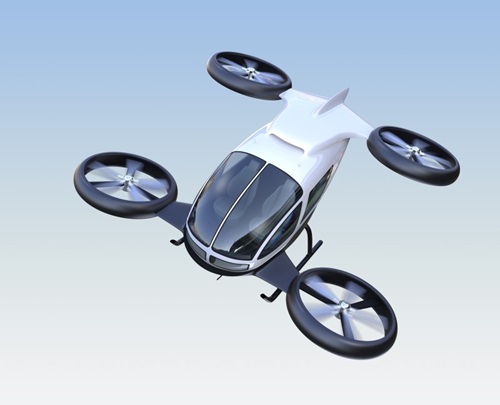Optimal Control Techniques for Unpiloted Aerial Vehicles (UAVs) - Online Guided Short Course (Starts April 17, 2024) 17 April - 8 May 2024 Online
- 17April — 8 May 2024 (4 weeks, 10 Lectures of self-study, weekly discussion groups, 14 Hours Total)
- Instructor-led discussion groups every Wednesday at 1—2 p.m. ET (April 17, 24, May 1 and 8)
- This unique guided online course covers the application of optimal control theory for unmanned aerial vehicles (UAVs).
- All students will receive an AIAA Certificate of Completion at the end of the course
OVERVIEW
This unique guided online course (approx. 10-hours of self-study, with weekly classes/discussions) covers the application of optimal control theory for unpiloted aerial vehicles (UAVs). The theoretical topics introduced are: variational necessary conditions for optimal control and the Pontryagin Minimum Principle; the Legendre pseudospectral method for direct numerical trajectory optimization; the linear quadratic regulator; and optimal path search methods on graphs. The discussion on these theoretical topics is focused on applications, and many intricate proofs are omitted. UAV application examples are demonstrated, including: autopilot design, reference trajectory tracking, optimal reference trajectory generation in drift (wind) fields and threat fields. Examples of recent advances in the state-of-the-art are discussed, and optional self-assessment problems are also included.
LEARNING OBJECTIVES
- Apply variational optimal control theory to find trajectories for aircraft models.
- Design LQR control laws for autopilot and trajectory tracking applications.
- Review and apply path optimization algorithms for planning in discretized environment models.
- Review and apply pseudospectral trajectory optimization techniques for numerical trajectory optimization.
- Industry, Government, and Academia practitioners with interests in UAV trajectory design, optimization, and/or tracking applications.
- Graduate students: aerospace, robotics, or mechanical engineering majors with interests in practical UAV applications.
- Recommended Background is basic familiarity with ordinary differential equations, linear algebra, and introductory control theory, as covered in typical curricula for an undergraduate degree in Aerospace, Mechanical, or Electrical Engineering (e.g., familiarity with linear control theory and PID feedback control). Familiarity with aircraft dynamics is beneficial but not essential. The course material includes optional sample code in MATLAB®. To peruse this code, fluency with MATLAB® is required. To complete the optional self-assessment problems, which may be done independently of the sample code provided, fluency with at least one programming language suitable for scientific computations is required. Background Competency Self-Assessment
COURSE FEES (Sign-In to Register):
CEUs/PDHs: Receive an AIAA Certificate of Completion and 14 Hours CEU/PDH Credit upon completion.
Cancellation Policy: A refund less a $50.00 cancellation fee will be assessed for all cancellations made in writing prior to 14 days before the start of the event. After that time, no refunds will be provided.
- AIAA Member: $595 USD
- Non-Member: $795 USD
- AIAA Student Member: $395 USD
- AIAA Student Member: $395 USD
Cancellation Policy: A refund less a $50.00 cancellation fee will be assessed for all cancellations made in writing prior to 14 days before the start of the event. After that time, no refunds will be provided.
Contact: Please contact Lisa Le or Customer Service if you have any questions about the course or group discounts.
Outline
1) Introductory Ideas
2) Direct Numerical Trajectory Optimization
a) Course Overview (13:04)
b) UAV Applications (14:14)
c) Review – Unconstrained Optimization (21:23)
d) Review – Constrained Optimization (27:52)
e) From NLP to Optimal Control (14:48)
f) Canonical Optimal Control Problem Formulation (22:30)
2) Direct Numerical Trajectory Optimization
a) Initial- and Boundary Value Problems (21:05)
b) Legendre Pseudospectral Method (27:22)
c) Application Examples (34:55)
3) Variational Approach to Optimal Control
a) Necessary Conditions (22:06)
b) Application Example: Zermelo Minimum-Time Navigation Problem (35:25)
c) Application Example: Navigation with Minimum Threat Exposure (25:22)
d) Pontryagin Minimum Principle (12:57)
e) PMP Application Example: Double Integrator (28:18)
f) Dubins Paths (48:19)
4) Linear Quadratic Regulator
a) LQR Theory and Riccati Equations (48:21)
b) Autopilot Design (37:44)
c) Reference Trajectory Tracking (18:16)
5) Optimal Paths in Graphs
a) Graph Models of Sequential Decisions (24:32)
b) Dijkstra’s Algorithm and Application Example (25:07)
Materials
MATERIALS:
- All course slides and additional references will be available for immediate download. No part of these materials may be reproduced, distributed, or transmitted, unless for course participants. All rights reserved.
- Weekly discussion groups will be delivered via a Zoom virtual classroom. Connection information will be provided to registrants near to the course start date. Test your connection here: https://zoom.us/test
Instructors
The course instructor is Raghvendra V. Cowlagi, Associate Professor in the Aerospace Engineering Department at Worcester Polytechnic Institute, Worcester, MA. Previously, he obtained a Ph.D. in Aerospace Engineering from Georgia Tech (advisor: P. Tsiotras); worked as a postdoctoral researcher at MIT (sponsor: E. Frazzoli); and worked as a researcher at Aurora Flight Sciences Corp., Cambridge, MA. His research and teaching interests are in planning, optimal control, and estimation for autonomous mobile vehicles. His research is funded by the US Air Force Office of Scientific Research (AFOSR) and the National Science Foundation, and is published in several leading journals and peer-reviewed conferences. He is a recipient of the 2016 AFOSR Young Investigator award, the 2017 Sigma Xi Outstanding Junior Faculty award, and the 2019 Moruzzi Award for Innovation in Undergraduate Education at WPI. He serves as Associate Editor for the IEEE Control Systems Society Conference Editorial Board, Associate Editor for the Aerospace Science & Technology journal, and is a member of the AIAA Guidance, Navigation, & Control Technical Committee. He is a Senior Member of AIAA and Senior Member of IEEE.
Email: rvcowlagi.research@gmail.com Website: https://users.wpi.edu/~rvcowlagi/
AIAA Training Links
For information, group discounts,
and private course pricing, contact:
Lisa Le, Education Specialist (lisal@aiaa.org)

